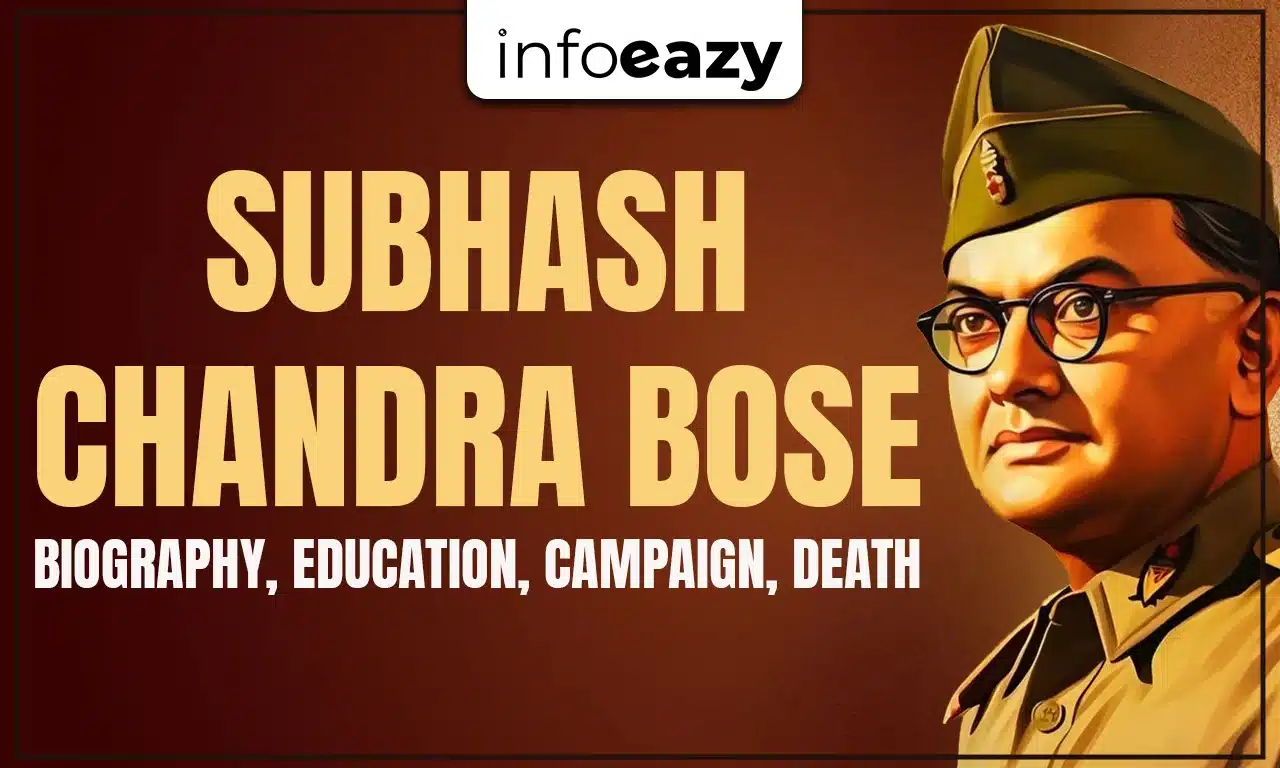Subhash Chandra Bose was one of the greatest freedom fighters of India. Popularly known as Netaji, he played a major role in the Indian independence movement by organizing the Azad Hind Fauj. His courage, leadership, and vision inspired millions of Indians to fight against British colonial rule, making him a legendary national hero.
Subhash Chandra Bose
Subhash Chandra Bose was born on 23 January 1897 in Cuttack, Odisha, in a wealthy and respected family. His father, Janakinath Bose, was a lawyer, while his mother, Prabhavati Devi, was a devoted homemaker. From a young age, Bose was deeply patriotic and displayed leadership qualities that later shaped his political career.
Bose became a powerful voice for India’s independence and challenged British authority fearlessly. His title “Netaji” means respected leader, which was given by Indian soldiers in the Azad Hind Fauj. His efforts in leading the Indian National Army made him a symbol of bravery and determination in India’s freedom movement.
Also Read: Lal Bahadur Shastri
Biography of Subhash Chandra Bose
Subhash Chandra Bose’s life was full of determination, struggle, and leadership. From being an outstanding student to becoming the commander of the Azad Hind Fauj, his journey reflects courage. He worked in the Indian National Congress initially but later formed his own path toward independence, showing his bold vision for India.
| Personal Information of Subhash Chandra Bose | |
| Particulars | Details |
| Full Name | Subhash Chandra Bose |
| Date of Birth | 23 January 1897 |
| Place of Birth | Cuttack, Odisha, India |
| Father’s Name | Janakinath Bose |
| Mother’s Name | Prabhavati Devi |
| Popular Title | Netaji |
| Organizations | Forward Bloc, Azad Hind Fauj |
| Date of Death | 18 August 1945 (uncertain) |
| Place of Death | Reported in Taipei, Taiwan (disputed) |
| Cause of Death | Plane crash (official version) |
Education of Subhash Chandra Bose
Subhash Chandra Bose was a brilliant student. He studied at Ravenshaw Collegiate School, Cuttack and later at Presidency College, Calcutta. He pursued philosophy at the Scottish Church College and later went to Cambridge University, England, where he prepared for the Indian Civil Services (ICS) examination, successfully clearing it in 1920.
Although he cleared the ICS, he resigned from the service in 1921, as he did not want to work under British rule. His education gave him intellectual depth and leadership qualities, but his patriotism made him choose the path of freedom struggle. His decision reflected his courage and determination.
Campaigns Led by Subhash Chandra Bose
Unlike leaders who believed in non-violence, Bose advocated for armed struggle. He organized the Azad Hind Fauj (Indian National Army) and sought international support from Germany and Japan during World War II. His campaigns aimed to weaken British power and inspire Indians to fight for independence through military action.
| Major Campaigns by Subhash Chandra Bose | ||
| Campaign/ Organization | Year | Objective |
| Indian National Congress | 1920s-1939 | Worked as a Congress leader, later resigned |
| Forward Bloc | 1939 | To strengthen anti-British movements |
| Azad Hind Fauj | 1942-1945 | To launch armed struggle against the British |
| Azad Hind Government | 1943 | Formed a provisional government in exile |
Major Events of Bose’ Life
These events show his transformation from a student leader to an international figure in India’s freedom struggle. His journey highlights his determination and bravery to challenge colonial rule with strength and confidence. Some significant events of Subhash Chandra Bose’s life are:
- 1897: Born in Cuttack, Odisha.
- 1920: Cleared Indian Civil Services but resigned in 1921.
- 1921: Joined the Indian National Congress.
- 1938: Became Congress President at Haripura session.
- 1939: Resigned from Congress and founded Forward Bloc.
- 1942: Escaped house arrest, reached Germany, then Japan.
- 1943: Formed Azad Hind Government in Singapore.
- 1945: Reportedly died in a plane crash in Taipei.
Death of Subhash Chandra Bose
Subhash Chandra Bose’s death remains one of the biggest mysteries in Indian history. Officially, it is stated that he died on 18 August 1945 in a plane crash in Taipei, Taiwan, but many believed he survived and lived secretly. Several committees investigated, but no conclusive evidence was ever found.
His mysterious death left millions of Indians in shock. For many, he became a martyr whose spirit continued to inspire the freedom movement. Even today, debates around his disappearance keep his legacy alive. Netaji’s sacrifice remains a symbol of bravery and undying love for the nation.
Slogans of Subhash Chandra Bose
Bose gave powerful slogans that filled Indians with courage and determination. These slogans reflected his fearless spirit and inspired Indians to rise against the British Empire. Some of his famous slogans are:
- “Give me blood, and I shall give you freedom.”
- “Jai Hind.”
- “It is blood alone that can pay the price of freedom.”
- “Delhi Chalo.”
Important Facts Related to Subhash Chandra Bose
These facts show his courage, leadership, and selfless service to the nation. His actions went beyond boundaries, making him one of the most influential leaders in the Indian freedom movement. His role in uniting Indians continues to inspire young generations today.
- Born on 23 January 1897; his birthday is celebrated as Parakram Diwas.
- Cleared the ICS exam but resigned to join freedom struggle.
- Formed the Forward Bloc after leaving Congress.
- Founded the Azad Hind Fauj (INA) with Japanese support.
- Gave the slogans “Jai Hind” and “Give me blood, I shall give you freedom.”
Conclusion
Subhash Chandra Bose remains one of the most dynamic leaders of India’s freedom struggle. His education, campaigns, and leadership in forming the Azad Hind Fauj inspired millions. His mysterious death continues to spark curiosity. For students and exam aspirants, learning about Bose provides important lessons of courage, patriotism, and determination.
Subhash Chandra Bose FAQs
Q1. When was Subhash Chandra Bose born?+
Q2. What was the education of Subhash Chandra Bose?+
Q3. What organization did Subhash Chandra Bose form in 1939?+
Q4. What was the role of Subhash Chandra Bose in World War II?+
Q5. How did Subhash Chandra Bose die?+
Tags: bose subhash subhash chabdra bose Subhash Chandra Bose




